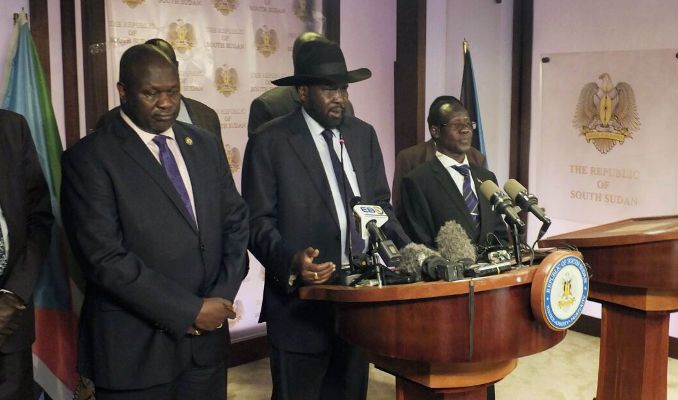JMEC’s IGAD-Plus representatives call for dialogue in South Sudan

October 15, 2016 (JUBA) – Representatives of the Intergovernmental Authority on Development (IGAD), Troika (United States, United Kingdom and Norway), and European Union (EU) in the Joint Monitoring and Evaluation Commission (JMEC) have condemned calls by opposition leaders for a renewal of armed conflict in South Sudan.
The body which was supposed to monitor the implementation of the peace agreement, but weakened by the renewal of violence from 8 July, however called on the parties led by President Salva Kiir and Riek Machar, the ousted First Vice President, to resort to dialogue rather than violence.
In a joint statement issued on Friday, JMEC partners said further fighting will not solve South Sudan’s pressing political and economic challenges, arguing that it will only increase the suffering of South Sudan’s people, “worsen a grave humanitarian crisis, and further inflame ethnic tensions.”
“Both the government and armed opposition groups bear responsibility for renewed hostilities since July’s clashes in Juba. We are deeply concerned by heavy fighting around the country in recent weeks, including near Yei, Wau, Bentiu, and Nassir. We are particularly alarmed by reports of widespread violence against civilians. As a result of this violence, more civilians have been internally displaced and more than one million South Sudanese have now sought refuge in neighboring countries,” partly reads the statement extended to Sudan Tribune.
“Continued conflict in South Sudan threatens the peace and security of its neighbors and the region. In line with the Agreement on the Resolution of the Conflict in the Republic of South Sudan, we call on the government and armed opposition groups to immediately adhere to the permanent ceasefire,” the statement said.
Resolving South Sudan’s conflicts, it said, requires genuine and inclusive dialogue representing the viewpoints of all South Sudanese people.
“We therefore call on the Transitional Government of National Unity and leaders of opposition groups alike to recommit themselves, consistent with the peace agreement, to peaceful dialogue based on the following principles,” it further said.
It added that the parties must agree to resolve their differences through a political process rather than through armed conflict, saying “The political process must be inclusive of all parties, communities, factions, and voices.”
“The parties must agree to undertake implementation of the reforms outlined in the Agreement on the Resolution of the Conflict in the Republic of South Sudan,” it added.
JMEC’s partners admitted that returning to dialogue after the violence was a “difficult” one, but said they would support the process without indicating how the process would entail and how the ousted First Vice President, Machar, would assume his position.
“We fully understand that the process of rebuilding trust and undertaking necessary compromises will [be] a difficult one, and are prepared to support that process. We firmly believe that South Sudan’s leaders must finally act to meet the demands of their people and end this senseless conflict,” the statement said.
The statement was endorsed and signed by representatives of the Federal Democratic Republic of Ethiopia, Republic of Kenya, Uganda, Sudan, the European Union, Kingdom of Norway, United Kingdom and the United States of America.
(ST)
